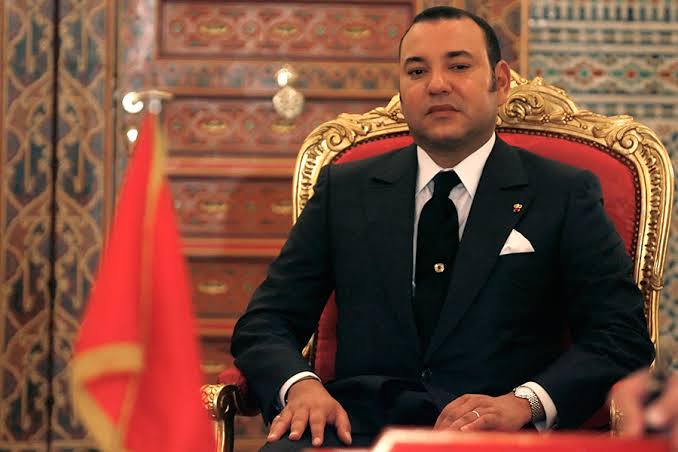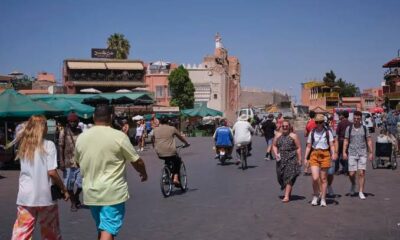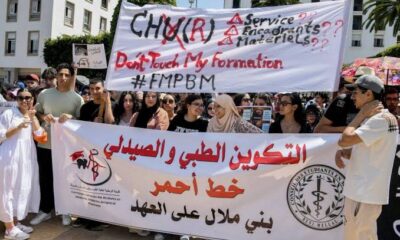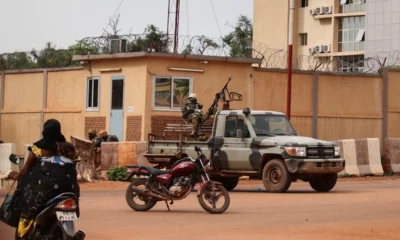Strictly Personal
The Double Encirclement of Morocco on the Diplomatic Frontline, By Aziz Boucetta
Published
2 years agoon

Ever since King Mohammed VI’s speech in 2016 in Riyadh, the position of Morocco has been evolving, and its diplomatic relations are on the move, with both lines of alliance and fracture. The combination of Morocco’s new geopolitical ambitions in addition to the internal political shifts occurring in its neighboring countries created a sort of hostility in its immediate, and even secondary environment. Abdallah Laroui used to say that Morocco is an island; that is the case now more than ever.
What sets the country apart from its neighbors is its long-lasting monarchy, namely that its ruling monarchy breeds resilience and constancy across centuries whereas in neighboring countries, leaders and policies have changed radically over the past few years. This creates a divide in the diplomatic landscape of the region.
The first line of neighbors
In Spain, the arrival of Pedro Sanchez in 2018 after the Mariano Rajoy government’s seven years in power allowed for a spectacular rapprochement between Madrid and Rabat on the heels of, admittedly, a nearly complete freezing of relations. The letter the Spanish Prime Minister sent King Mohammed VI in March 2022 has considerably strengthened ties between Madrid and Rabat.. However, Morocco still remains the “unloved one” of Spanish foreign and even domestic policy.
Sanchez’s famed letter to the Moroccan monarch has created a lot of turmoil for its author, both from the perspective of Spanish society at large and, above all, from that of the political class, which saw his gesture as the Spanish government’s capitulation to Moroccan demands. The durability of the newfound Morocco-Spain reconciliation therefore remains open to question, despite Spanish Prime Ministers’ tendency to embrace realpolitik once in office.
The Algerian case is clearer in this regard. Hostility towards Morocco has been the constant in Algeria since 1963, with the exception of rare phases of improvement. During the Bouteflika era (1999–2019), relations between Algiers and Rabat were a “stormy friendship” at times, but most often a “courteous” animosity. Ever since the arrival of the Chengriha-Tebboune duo, however, the two countries have never been closer to a direct confrontation, with increasingly sealed borders, broken or severed diplomatic relations, and access to Algerian skies restricted to Moroccan aircrafts…
Faced with such a bellicose neighbor, Morocco has increasingly taken steps to prepare for any eventuality. The best signs of the kingdom’s preparedness are its defense deals with Israel and the creation of an eastern defense zone.
With Mauritania, relations remain stable. However, since the election of Mohamed Ghazouani in 2019, Nouakchott has undertaken to expand its partnerships, first drawing closer to the United Arab Emirates, whose diplomatic aggressiveness is well known; this aggressivity is showcased through the provision of aid equivalent to half of Mauritania’s GDP and an increasingly apparent military cooperation. There was also the visit of an Iranian diplomatic leader to Nouakchott last February, where he arrived on board an Algerian airplane. President Ghazouani has somehow “Mauritanized” King Mohammed VI’s famous Riyadh speech…
The spirit of that famous royal speech was the necessity for Morocco to maintain its traditional alliances while opening up to new partners. Yet Mauritania’s perceived rapprochement with Emiratis and Iranians is not necessarily good news for Rabat.
On the second line of neighbors
Morocco’s neighboring countries, including those that do not necessarily share borders with the kingdom, have of late tended to be less friendly than they used to be. Tensions with France, for example, are now common knowledge and, more serious than the differences between states, it is now societies that are drifting apart (mistrust of Moroccans and indifference of the French).
The maintenance of strong economic relations certainly has historic significance, but nothing seems to indicate the future persistence of the “French exception” in Morocco. All indicators actually suggest the opposite, based on the cultural, academic, economic, and emotional aspects.
This is also the case with Tunisia, with the difference that the growing distance between Tunis and Rabat is much more the result of President Kais Saïed’s current policy than the consequence of a fundamental divergence between the two traditionally friendly countries.
However, Macron’s France Maghreb policy is heightening tensions between Rabat and Tunis, tensions born of the Tunisian president’s welcoming of the leader of the Polisario separatists, and consolidated by the pressure exerted by Algiers on Tunis through the budgetary aid that Tunisia’s strangled public finances need. Tunisia cannot refuse Algeria anything, and it is an open secret that the Algerian regime shares France’s hostility towards Morocco.
Then there is Senegal. Since the beginning of 2023, multiple visits of King Mohamed VI to Dakar have been postponed, sometimes for health reasons, and other times without any known reason. President Macky Sall, who is maneuvering to run for an (unconstitutional) third term, is supported by Emmanuel Macron’s France, which strategically needs to keep Senegal in its fold, especially after its hasty withdrawal from the Sahel.
A “Dakar-Paris axis” can only be achieved to the detriment of Morocco, which, after the installation of Wagner militias in Mali with the benevolent neutrality of Algiers, now has only the Senegalese route to ensure the continental extension it so vaunts to its non-African partners.
As such, Morocco finds itself in a double chokehold between these two lines of hostile, unfriendly, and even distrustful neighborhood lines. After a decade of consistent, assertive, and at time even aggressive diplomatic actions, Rabat seems to have closed itself off from its geographical environment, preferring to extend its scope further away, towards the Israeli-American axis on one hand, and Arab-Gulf axis on the other hand, and even further away toward Asia and Latin America.
Is this a carefully thought-out policy, in light of the current geological upheavals and changes in alliance lines? Or is it the result of misunderstandings between Rabat and Paris, the two capitals having an equal (diplomatic) presence in this region of the world, with each party developing its competitive influence for its own strategic interests? Only time will tell.
You may like
-


Former President of Moroccan club Raja sentenced to 3 years in prison
-


Moroccan tourist arrivals hit record-breaking 16 million
-


Moroccan doctors stage nationwide protest in ‘Week of Anger’
-


Moroccan annual inflation rises to 0.8% in November
-


FIFA Ranking: Nigeria ends 2024 as fifth best team in Africa
-


Burkina Faso releases 4 French spies after Moroccan intervention
Strictly Personal
Let’s merge EAC and Igad, By Nuur Mohamud Sheekh
Published
2 months agoon
November 27, 2024
In an era of political and economic uncertainty, global crises and diminishing donor contributions, Africa’s regional economic communities (RECs) must reimagine their approach to regional integration.
The East African Community (EAC) and the Intergovernmental Authority on Development (Igad), two critical RECs in East Africa and the Horn of Africa have an unprecedented opportunity to join forces, leveraging their respective strengths to drive sustainable peace and development and advance regional economic integration and promote the African Continental Free Trade Area (AfCFTA).
Already, four of the eight Igad member states are also members of the EAC and, with Ethiopia and Sudan showing interest, the new unified bloc would be formidable.
Igad’s strength lies in regional peacemaking, preventive diplomacy, security, and resilience, especially in a region plagued by protracted conflicts, climate challenges, and humanitarian crises. The EAC, on the other hand, has made remarkable strides in economic integration, exemplified by its Customs Union, Common Market, and ongoing efforts toward a monetary union. Combining these comparative advantages would create a formidable entity capable of addressing complex challenges holistically.
Imagine a REC that pairs Igad’s conflict resolution strengths with the EAC’s diplomatic standing and robust economic framework. Member states of both are also contributing troops to peacekeeping missions. Such a fusion would streamline efforts to create a peaceful and economically prosperous region, addressing the root causes of instability while simultaneously promoting trade investment and regional cooperation.
These strengths will be harnessed to deal with inter-state tensions that we are currently witnessing, including between Ethiopia and Somalia over the Somaliland MoU, strained relations between Djibouti and Eritrea, and the continually deteriorating relations between Eritrea and Ethiopia.
The global economy experienced as a result of the COVID-19 pandemic, compounded by the Ukraine war and competing global crises, has strained donor countries and reduced financial contributions to multilateral organisations and African RECs. Member states, many of which are grappling with fiscal constraints, are increasingly unable to fill this gap, failing to make timely contributions, which is in turn affecting key mandate areas of Igad and EAC, and staff morale.
A merger between Igad and EAC would alleviate this financial pressure by eliminating redundancies. Shared administrative systems, integrated programmes, and a unified leadership structure would optimise resources, enabling the new REC to achieve more with less. Staff rationalisation, while sensitive, is a necessary step to ensure that limited funds are channelled toward impactful initiatives rather than duplicative overheads.
The African Union (AU) envisions a fully integrated Africa, with RECs serving as the building blocks of the AfCFTA. A unified EAC-Igad entity would become a powerhouse for regional integration, unlocking economies of scale and harmonising policies across a wider geographical and economic landscape.
This merger would enhance the implementation of the AfCFTA by creating a larger, more cohesive market that attracts investment, fosters innovation, and increases competitiveness. By aligning trade policies, infrastructure projects, and regulatory frameworks, the new REC could serve as a model for others, accelerating continental integration.
The road to integration is not without obstacles. Political will, divergent institutional mandates, and the complexity of harmonising systems pose significant challenges. However, these hurdles are surmountable through inclusive dialogue, strong leadership, and a phased approach to integration.
Member states must prioritise the long-term benefits of unity over short-term political considerations. Civil society, the private sector, the youth, and international partners also have a critical role to play in advocating for and supporting this transformative initiative.
The time for EAC and Igad to join forces is now. By merging into a single REC, they would pool their strengths, optimise resources, and position themselves as a driving force for regional and continental integration. In doing so, they would not only secure a prosperous future for their citizens and member states but also advance the broader vision of an integrated and thriving Africa.
As the world grapples with crises, Africa must look inward, embracing the power of unity to achieve its potential. A combined Igad-EAC is the bold step forward that the continent needs.
Nuur Mohamud Sheekh, a diplomatic and geopolitical analyst based in London, is a former spokesperson of the Igad Executive Secretary. X: @NuursViews
Strictly Personal
Budgets, budgeting and budget financing, By Sheriffdeen A. Tella, Ph.D.
Published
2 months agoon
November 20, 2024
The budget season is here again. It is an institutional and desirable annual ritual. Revenue collection and spending at the federal, State and local government levels must be authorised and guided by law. That is what budget is all about. A document containing the estimates of projected revenues from identified sources and the proposed expenditure for different sectors in the appropriate level of government. The last two weeks have seen the delivery of budget drafts to various Houses of Assembly and the promise that the federal government would present its draft budget to the National Assembly.
Do people still look forward to the budget presentation and the contents therein? I am not sure. Citizens have realised that these days, governments often spend money without reference to the approved budget. A governor can just wake up and direct that a police station be built in a location. With no allocation in the budget, the station will be completed in three months. The President can direct from his bathroom that 72 trailers of maize be distributed to the 36 states as palliatives. No budget provision, and no discussion by relevant committee or group.
We still operate with the military mentality. We operated too long under the military and of the five Presidents we have in this democracy, two of them were retired military Heads of State. Between them, they spent 16 years of 25 years of democratic governance. Hopefully, we are done with them physically but not mentally. Most present governors grew up largely under military regimes with the command system. That is why some see themselves as emperor and act accordingly. Their direct staff and commissioners are “Yes” men and women. There is need for disorientation.
The importance of budget in the art of governance cannot be overemphasized. It is one of the major functions of the legislature because without the consideration and authorisation of spending of funds by this arm of government, the executive has no power to start spending money. There is what we refer to as a budget cycle or stages. The budget drafting stage within the purview of the executive arm is the first stage and, followed by the authorisation stage where the legislature discusses, evaluates and tinkers with the draft for approval before presenting it to the President for his signature.
Thereafter, the budget enters the execution phase or cycle where programmes and projects are executed by the executive arm with the legislature carrying out oversight functions. Finally, we enter the auditing phase when the federal and State Auditors verify and report on the execution of the budgets. The report would normally be submitted to the Legislature. Many Auditor Generals have fallen victim at this stage for daring to query the executives on some aspects of the execution in their reports.
A new budget should contain the objectives and achievements of the preceding budget in the introduction as the foundation for the budget. More appropriately, a current budget derives its strength from a medium-term framework which also derives its strength from a national Development Plan or a State Plan. An approved National Plan does not exist currently, although the Plan launched by the Muhammadu Buhari administration is in the cooler. President Tinubu, who is acclaimed to be the architect of the Lagos State long-term Plan seems curiously, disillusioned with a national Plan.
Some States like Oyo and Kaduna, have long-term Plans that serve as the source of their annual budgets. Economists and policymakers see development plans as instruments of salvation for developing countries. Mike Obadan, the former Director General of the moribund Nigeria Centre for Economic and Management Administration, opined that a Plan in a developing country serves as an instrument to eradicate poverty, achieve high rates of economic growth and promote economic and social development.
The Nigerian development plans were on course until the adoption of the World Bank/IMF-inspired Structural Adjustment Programme in 1986 when the country and others that adopted the programme were forced to abandon such plan for short-term stabilisation policies in the name of a rolling plan. We have been rolling in the mud since that time. One is not surprised that the Tinubu administration is not looking at the Buhari Development Plan since the government is World Bank/IMF compliant. It was in the news last week that our President is an American asset and by extension, Nigeria’s policies must be defined by America which controls the Bretton Woods institutions.
A national Plan allows the citizens to monitor quantitatively, the projects and programmes being executed or to be executed by the government through the budgeting procedure. It is part of the definitive measures of transparency and accountability which most Nigerian governments do not cherish. So, you cannot pin your government down to anything.
Budgets these days hardly contain budget performance in terms of revenue, expenditure and other achievements like several schools, hospitals, small-scale enterprises, etc, that the government got involved in successfully and partially. These are the foundation for a new budget like items brought forward in accounting documents. The new budget should state the new reforms or transformations that would be taking place. Reforms like shifting from dominance of recurrent expenditure to capital expenditure; moving from the provision of basic needs programmes to industrialisation, and from reliance on foreign loans to dependence on domestic fund mobilisation for executing the budget.
That brings us to the issue of budget deficit and borrowing. When an economy is in recession, expansionary fiscal policy is recommended. That is, the government will need to spend more than it receives to pump prime the economy. If this is taken, Nigeria has always had a deficit budget, implying that we are always in economic recession. The fact is that even when we had a surplus in our balance of payment that made it possible to pay off our debts, we still had a deficit budget. We are so used to borrowing at the national level that stopping it will look like the collapse of the Nigerian state. The States have also followed the trend. Ordinarily, since States are largely dependent on the federal government for funds, they should promote balanced budget.
The States are like a schoolboy who depends on his parents for school fees and feeding allowance but goes about borrowing from classmates. Definitely, it is the parents that will surely pay the debt. The debt forgiveness mentality plays a major role in the process. Having enjoyed debt forgiveness in the past, the federal government is always in the credit market and does not caution the State governments in participating in the market. Our Presidents don’t feel ashamed when they are begging for debt forgiveness in international forum where issues on global development are being discussed. Not less than twice I have watched the countenance of some Presidents, even from Africa, while they looked at our president with disdain when issues of debt forgiveness for African countries was raised.
In most cases, the government, both at the federal and state cannot show the product of loans, except those lent by institutions like the World Bank or African Development Bank for specific projects which are monitored by the lending institutions. In other cases, the loans are stolen and transferred abroad while we are paying the loans. In some other cases, the loans are diverted to projects other than what the proposal stated. There was a case of loans obtained based on establishing an international car park in the border of the State but diverted to finance the election of a politician in the State. The politician eventually lost the election but the citizens of the State have to be taxed to pay the loan. Somebody as “Nigeria we hail thee”.
Transformation in budgeting should commence subsequently at the State and federal level. Now that local government will enjoy some financial autonomy and therefore budgeting process, they should be legally barred from contracting foreign loans. They have no business participating in the market. They should promote balanced budget where proposed expenditures must equal the expected revenues from federal and internal sources. The State government that cannot mobilise, from records, up to 40 percent of its total budget from IGR should not be supported to contract foreign loans. The States should engage in a balanced budget. The federal government budget should shift away from huge allocations to recurrent expenditure towards capital expenditure for capital formation and within the context of a welfarist state.
Sheriffdeen A. Tella, Ph.D.
EDITOR’S PICK


Nigeria: Marketers predict further price cut as another refinery begins operations
Oil marketers and the Nigerian Midstream and Downstream Petroleum Regulatory Authority expect refined petroleum product prices to reduce as another...


Kenya: Consumer inflation rises to 3.0% from 2.8%
Kenya’s statistics agency said on Tuesday that Kenya’s consumer price inflation increased slightly to 3.0% year-over-year in December from 2.8%...


South Africa’s Transnet’s half-year deficit hits $117m
Transnet, a state-owned logistics company in South Africa, announced on Tuesday that it had lost 2.2 billion rand ($117.48 million)...


Nigeria, China extend $2bn currency swap deal
A 15 billion yuan ($2 billion) currency-swap arrangement between China and Nigeria has been extended to boost investment and commerce...


Egypt’s central bank maintains overnight rates
As anticipated, Egypt’s central bank has maintained its overnight interest rates, stating that although inflation was predicted to drop significantly...


Illicit flows cost Nigeria, others $1.6bn daily— AfDB
According to the African Development Bank (AfDB), illicit money flows and profit shifting by multinational corporations doing business in Africa...


‘Don’t start what you can’t finish’, ex-Nigerian official replies President Tchiani
Former Nigerian Aviation Minister, Femi Fani-Kayode, has told President Abdourahamane Tchiani of Niger Republic to refrain from making infantile and...


Again, Starlink raises prices of its services in Nigeria
Elon Musk’s satellite internet service provider, Starlink, has again jacked up the prices of its services in Nigeria after an...


Former President of Moroccan club Raja sentenced to 3 years in prison
The former President of Moroccan top club, Raja Casablanca, Mohamed Aouzal, has been sentenced to three and a half years...


Zambia announces second case of Mpox as country battles cholera outbreak
The Zambian Ministry of Health has reported a second case of Monkeypox, popularly known as Mpox, in Kitwe region of...


